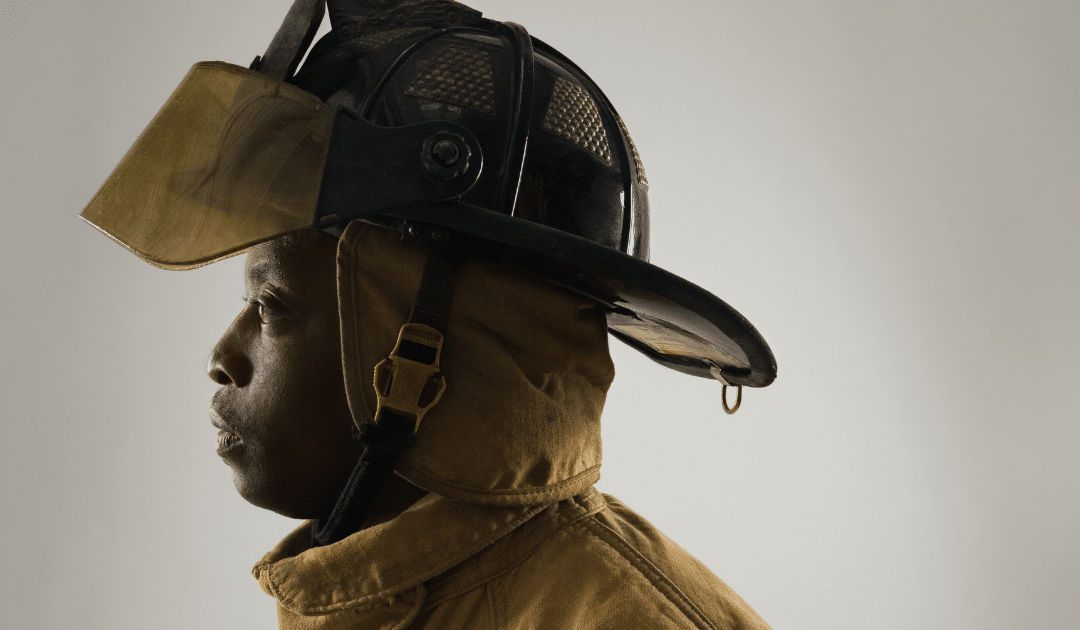“I’m thought of as a unicorn because of who I am: Black, male, and therapist,” said Blaise Harris, a licensed clinical mental health counselor and a member of the North Carolina First Responder Peer Support.
Recent data from the American Psychological Association confirms what most of us already know: Very few Black male therapists in the United States. Even fewer, though, are providers who also specialize in counseling for special responders or worked as firefighters. We had the pleasure of sitting down and speaking to Mr. Harris about his time working as a first responder and the mental health struggles he has seen firsthand.
Amid the COVID-19 pandemic and seemingly endless onslaught of challenges from 2020 to date, it’s no surprise that Americans reported feeling more anxious and depressed. To make matters worse, among first responders, firefighters reported the highest instances of depression, according to a 2018 report by the Substance Abuse and Mental Health Services Administration. “It wouldn’t be a surprise if those numbers were higher today, especially during the pandemic,” Harris said.
Harris is personally aware of the struggles and stressors that come with working as a firefighter and the fact that first responders are at a much greater risk to develop post-traumatic stress disorder than the general public. After working as a firefighter for almost 15 years, Harris knew he wanted to become a therapist to help himself and others through the power of therapeutic relationships.
How to stop counseling stigma from spreading
One of the biggest barriers to firefighters’ mental health is the fear of the stigma associated with it and the thought they may seem weak or even lose their jobs. Therapy (in general) is often stigmatized, and most firehouses in the U.S. don’t have the resources to staff a behavioral health provider. That’s why his organization exists – to pair struggling first responders with peer counselors who understand what they are going through and help prevent first responder suicide.
According to experts like Harris, a first step forward is to be transparent and be vulnerable about your mental health challenges.
“The biggest thing for me is showing people that I am vulnerable about my issues. I’m very upfront about the things that I have been through and that I am not always the happy-go-lucky person that you get to see,” said Harris. “I know that once I start sharing my story with people, they start to see that it’s OK for you to talk about your feelings and what you’re facing.”
Harris said he grew up hearing disparaging comments in the Black community about mental illness in general, like “You can’t go to therapy because you’re weak or if you go to therapy there’s something wrong with you.” He said he sees lots of overlap between the extra stigma of seeking therapy as a Black man and the counseling stigma among first responders, especially firefighters.
Start with being kind to your mind
While firefighters are trained to keep nerves of steel while on duty, it doesn’t negate the unique challenges that exist outside of the job.
Harris said he’s seen many firefighters excel at compartmentalizing other challenges like deaths, divorces, and illnesses and instead replace them with fire service work. While this strategy may feel like the perfect solution at the time, it isn’t healthy long-term.
“Being at the station was what kept me going and when I got off work, that’s when everything starts to take a toll, so I always ask firefighters are you getting off work to rest? Take a break? Take care of yourself?” he said. And when you don’t take enough time to rest and recover from these stressors, they can balloon into mental health problems. But even if they do, it’s absolutely nothing you should be embarrassed or feel guilty about.
Mental health is just as important as your physical health, and you owe it to yourself, and those around you, to maintain it.
Breaking the cultural barrier with empathy
Ending the stigma of mental health counseling in the fire service industry will require a shift in the culture. It’s not enough to start or even simply continue the conversation about breaking these mental health barriers. Action needs to take place. The myth of the mentally invulnerable first responder is harmful and unrealistic.
As the International Association of Fire Fighters acknowledged in a report, there’s plenty of work to be done to improve mental health awareness and when to seek treatment. According to Harris, the more we are getting the word out about first responder mental health awareness- the more we will see positive change. Even now, compared to years prior, there seems to more understanding and acceptance of mental illness and stress management among firefighters than he’s seen before.
“I think we’re starting to see that more people are taking the time to realize that hey, it’s OK not to be OK,” said Harris. The more we talk about these issues, the more we can normalize them. Let’s end the stigma, for first responders and around the world.
Sponsored by California Casualty
Written By Police1 BrandFocus Staff
- Graduation – When to Remove Your Child from Your Auto Policy - May 18, 2023
- How to Prevent Catalytic Converter Theft - May 17, 2023
- How Much Does Home Insurance Cost? - May 17, 2023

